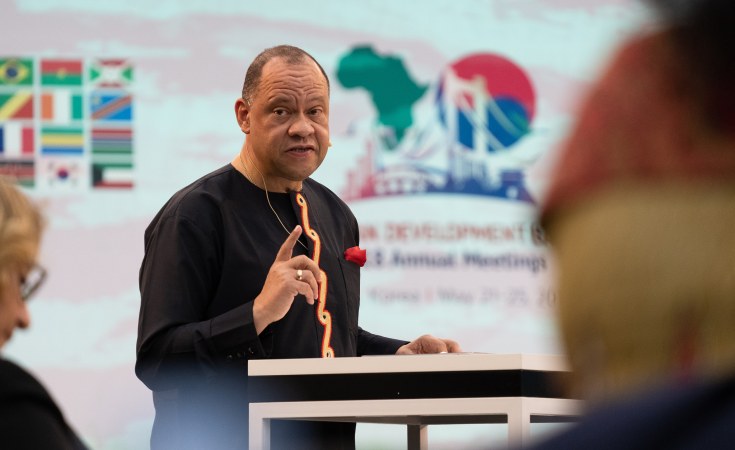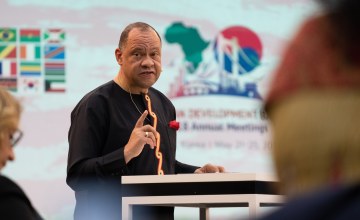In the lead-up to the 53rd Annual Meetings of the African Development Bank, Bank Group Secretary General Vincent Nmehielle explains the rationale behind this year’s industrialization theme and promises fruitful deliberations.
The 2018 Annual Meetings of the African Development Bank Group open Wednesday May 23, in Busan, Korea. Would you explain the role of the Annual Meetings in the Bank’s governance?
The Annual Meetings are an important annual statutory event. This is when the Board of Governors of the Bank and the African Development Fund meet and review Bank activities over the period. It is the most important statutory event in the institution’s operation.
What issues are usually debated at these meetings?
The Governors and subsidiary bodies discuss the Bank’s financial situation of course, review its various activities over the previous year and make recommendations. In addition, there are the pertinent conclusions of the Annual Meetings and the roadmap for the years ahead, especially regarding the resources that the Bank needs to continue to fulfill its role and measure up to the huge challenges posed by the development of Africa.
Some development institutions have two annual meetings each year, while the African Development Bank only has one. Why is this the case?
The World Bank is the only multilateral development institution to have two annual meetings, a general meeting in spring, usually in April, and annual meetings later in the year. It is a sensible, logical choice. Here at the African Bank, though, we have Annual Meetings that are usually held in May
How does the African Development Bank operate on a daily basis, in between the Annual Meetings?
Things are very clear on this point: as soon as we finish our Annual Meetings for the current year, we start preparing for the next year’s meetings. The Bank continues its daily work with approvals for projects to be implemented in its regional member countries. As soon as Busan closes, for example, we will start work on preparations for the 2019 Annual Meetings to be held in Malabo, Equatorial Guinea.
In 2018, Group President Akinwumi Adesina instituted consultations with regional member countries which he intends to make a regular annual feature. Are they a sign of changing Bank governance?
This is the very first time in the history of the Bank that such an initiative has been taken. President Adesina is convinced that the Governors should be closely involved in Bank governance. In practice, our Governors' are entirely devoted to managing daily national issues. By inviting them to regional consultations, President Adesina's intention was to have them come to the Bank to show them its achievements and its direction, and to hear their needs.
So, it's a way of helping them take ownership of the Bank's work, then?
Precisely. The Governors are the highest-ranking Bank representatives. It is their Bank. And so, it is both fair and legitimate that they should interact with the Bank's senior management, especially its president.
Two successive Annual Meetings have been held outside the African continent, in India in 2017 and in Korea in 2018. Is this evidence of an increasingly important role for non-African countries in the Bank? Might some not fear that the Bank is losing its African soul?
Not in the least, neither now nor in the future. At its 2015 Annual Meetings in Lusaka, Zambia, the Bank decided to program its Annual Meetings for 5 years and the Board of Governors chose the non-regional and regional host countries from 2016 to 2021. That is why we held the 2017 Annual Meetings in Ahmedabad, India, and why are holding this year's meetings in Busan, Korea, this week. The 2019 Annual Meetings will be held in Malabo, and then in 2020 in Abidjan in Côte d’Ivoire and in Accra, Ghana, in 2021.
So, the three annual meetings after Busan will be held in Africa. There is nothing unusual about non-regional member countries generously offering to host the Annual Meetings. It then falls to the Board of Governors to evaluate the bids according to very detailed criteria. There is no reason to think that Africa is going to be dispossessed of its Bank.
What can you tell us about the central theme of this year's Annual Meetings, Accelerating Africa's industrialization?
This theme was chosen because it reflects the urgent need to take appropriate steps to speed up development in Africa. The rest of the world is moving forward at ever-greater speed. So, we too need to act more expeditiously. This is also why Busan may well be an exceptional opportunity to discuss how to accelerate African development. Come what may, we have no option but to change gears upward. The question now is, how do we accelerate Africa's industrialization? How are we going to get there? With what resources and with which partners?
Are you confident about the outcomes of the debates planned for these 54th Annual Meetings?
Of course, the Annual Meetings will be very successful. There is no reason not to be confident. We had a very successful meeting in Ahmedabad, India, last year. We expect to have very successful Annual Meetings in 2018 in Busan, South Korea.
Forthcoming Annual Meetings
- 2019, Malabo, Equatorial Guinea
- 2020, Abidjan, Côte d’Ivoire
- 2021, Accra, Ghana
Some key figures
- Nearly 3,000 participants are expected at Busan
- 80 Governors from 80 member countries
- 54 African States
- 26 non-African States
- 3 days of plenary and workshop sessions



